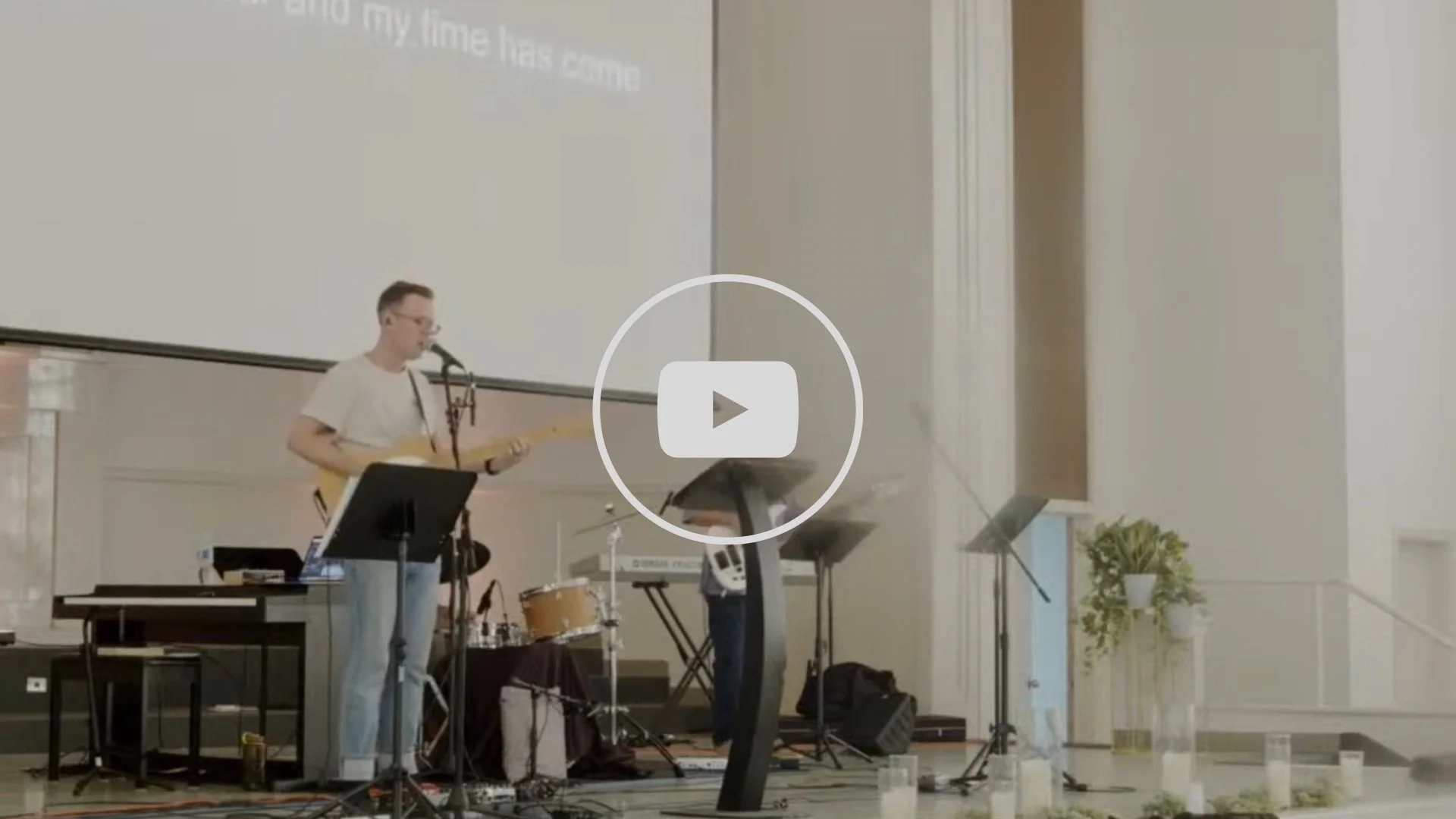Psalm 3 is what we would call a lamenting psalm. Lamenting is a passionate expression of grief, sadness, and pain.
Scholars estimate that two-thirds of the psalms are psalms of lament, which teaches us that a large portion of the Christian life will likely be filled with grief and pain. Life will not be easy; hardships will come. Yet, so often, when we encounter grief, we think we’re alone and that no one else understands what we’re feeling.
The Psalms, however, teach us that we’re not alone in our pain; we’re not the only ones in life who are stricken with grief. The heroes of our faith walked through trials, just like us. They were hurt, just like us. They wept, just like us.
Yet, these Psalms also teach us the beautiful truth that God, who is bigger than our hardships, draws near to the brokenhearted and is there for the lowly. God is bigger than all our hardships, and he freely offers us salvation through Jesus.
Perhaps you’re hurting today. Maybe your heart is filled with grief and pain. Well, the songs of lament that we’re preparing to study will teach us how to trudge through the muddy waters of grief with our eyes fixed on Jesus.
If you look at the header of this psalm in your Bible, you will notice it says, “A Psalm of David, when he fled from Absalom, his son.”
That’s super beneficial information for us today. Digging into who Absalom is and why David is fleeing from him will help add color to the cries of Psalm 3. So, let's first do a brief history lesson.
2 Samuel 15-17 tells the story of David fleeing Absalom. But I think a helpful practice when it comes to Bible reading is first familiarizing yourself with the context of your reading. So, I returned a few chapters and started reading what happened to David before he fled Absalom. We don’t often flee for no reason, so what’s going on here?
Well, if you turn back a few chapters to chapter 11, you will discover that David has fallen headfirst into sin. Bad sin. When David should have been out to battle, he stayed back in Jerusalem. Late one afternoon, he gets up from his couch and notices a beautiful woman bathing on her rooftop. It was Bathsheba, the wife of Uriah. David sent messengers to her and took her, and she came to him, and he laid with her. She conceived and was pregnant.
This deeply bothered David. Since her husband, Uriah, was off at battle, David knew that people would have questions. So, David, doing what many of us would do, sought to cover up his sin. He called Uriah off the battlefield and sent him home, hoping he would be with his wife. But Uriah refused. Therefore, David sent Uriah back to the battlefield with the command, “Set Uriah in the forefront of the hardest fighting, and then draw back from him, that he may be struck down, and die.” Uriah died, and after Bathsheba mourned his death of him, David brought her to his house to become his wife.
This angered the LORD. So, God, through Nathan, rebukes David. He tells a story of two men, one who was rich and the other who was poor. The poor man had nothing but one little lamb that he loved dearly; the rich man had many lambs. When a traveler came to the rich man, he was unwilling to take one of his own lambs. Instead, he prepared the poor man’s lamb for his visitor. This infuriated David, and he said, “As the LORD lives, the man who has done this deserves to die, and he shall restore the lamb fourfold because he did this thing and because he had no pity.” Nathan said, “You are this man!”
This led the LORD to say, “Behold, I will raise up evil against you out of your own house. And I will take your wives before your eyes and give them to your neighbor, and he shall lie with your wives in the sight of this sun. For you did it secretly, but I will do this thing before all Israel and before the sun.” So, because of David’s sin, evil will come against David from his own household.
Fast forward. One of David’s sons, Amnon, is in love with one of his half-sisters, Tamar. Tamar is Absalom’s sister. Amnon rapes Tamar. Then hate fills his heart toward her, and he kicks her out. Absalom discovers what Amnon did to his sister, and he grows to hate Amnon. This leads to Absalon eventually killing.
After killing Amnon, Absalom runs away.
After years of grieving the death of his son, Amnon, David begins to miss his Son, Absalom. So, David’s nephew begins to persuade David to allow Absalom to return. Absalom returned and lived outside of Jerusalem.
After some time, he began to sit outside the gates to Jerusalem every day. Anytime someone would journey into Jerusalem to see the king for judgments, Absalom would stop them and plant lies in their mind about David. He would say things like, “It’s a shame that the king cannot address your problems. But, if I were judge, I would make sure your needs were met.”
After years of doing this, Absalom persuaded a large portion of Israel, and he raised a revolt against his father, the king. It says, “The conspiracy grew strong, and the people with Absalom kept increasing,” leading to “the hearts of Israel going after Absalom.” This led to David and his servants fleeing. Somewhere in the time of David fleeing and hiding from his son, we find Psalm 3 penned.
Now, why do I share this story of David? I share it to add color to this Psalm.
On the one hand, can you imagine the heartbreak and pain that stems from your son hating you so much that he tries to take your job and kill you? That’s a bottle of grief that I hope I never have to open!
On the other hand, I want us to notice that David's leading cause of lament here is his own sin. Because of David’s sin with Bathsheba, Nathan said that God would “raise up evil against David out of his own house (2 Sam 12:11).” Absalom’s revolt against David was a part of God’s judgment against David. Yet, even in the eyes of the storm of God’s judgment, God’s hand is on David. Discipline is not the same thing as destruction. God disciplines those that he loves, but he doesn’t destroy them. God saves us from our sin. But he may not always save us from the consequences of our sin.
Perhaps you’ve sinned, and today you’re dealing with the repercussions of those sins. Maybe today, you find yourself in the eye of a storm you’ve honestly brought upon yourself. I hope this Psalm is water to your soul today. There is grace for you, just like there was grace for David. There is hope for you, just like there was hope for David. There are still blessings on the table for you, just like there were still blessings on the table for David.
So, let’s dive in.
“[1] O LORD, how many are my foes!
Many are rising against me;
[2] many are saying of my soul,
“There is no salvation for him in God.” Selah
[3] But you, O LORD, are a shield about me,
my glory, and the lifter of my head.
[4] I cried aloud to the LORD,
and he answered me from his holy hill. Selah
[5] I lay down and slept;
I woke again, for the LORD sustained me.
[6] I will not be afraid of many thousands of people
who have set themselves against me all around.
[7] Arise, O LORD!
Save me, O my God!
For you strike all my enemies on the cheek;
you break the teeth of the wicked.
[8] Salvation belongs to the LORD;
your blessing be on your people! Selah
This Psalm begins with David crying out to the LORD, informing him of what’s taking place in his life. Do you think God is unaware of what’s going on in David’s life? Of course not. Yet, under the inspiration of the Holy Spirit, David fills the LORD in on what’s taking place in his life. Friends, I’m here to tell you that God has invited you to his throne today. Although God knows everything, he invites you to tell him what’s happening in your life. God doesn’t need you to tell him what’s going on in your life. But he invites you to tell him what’s happening in your life. The beauty of prayer is that God invites us to invite him into the meticulous details of our lives.
That’s what David is doing here, inviting the LORD into the storm of his life! So, like a coiling boa constrictor squeezing its prey, David’s enemies are creeping in on him. In speaking of his foes, the term “many” means many. Absalom has stolen the heart of Israel, and the entire nation has risen against him. And, in speaking of his soul, they are saying he is without hope. God has forgotten him. God has abandoned him. David is without hope.
Oh, how difficult it is to embrace the truth about God when everyone around you is saying the opposite. Oh, how difficult it is to embrace the truth about God when our present circumstances seem to say otherwise. David is at a point where his circumstances and the multitude surrounding him say he is without hope.
So, what does David do? Does he throw in the towel and believe the lie spoke against him?
The word “selah” appears at the end of this introduction in verse 2. We’re not sure what Selah means. But, we believe it to be a call to pause and reflect. It is a time to let what has just been said simmer in our hearts.
So, what about you? What shapes your beliefs? Is it the message of the masses or the message of God? Do you sometimes feel as if many are rising against you? Do you sometimes feel as if there is no salvation for you in God? Does it feel like many are whispering about you today that you’re too far gone?
Instead of giving into despair, David runs to the LORD and says,
“[3] But you, O LORD, are a shield about me,
my glory, and the lifter of my head.
[4] I cried aloud to the LORD,
and he answered me from his holy hill. Selah”
Here, we see that David’s confidence rests solely in God. A shield offers protection. Glory and lifting a head offer dignity and honor. So, it’s in our weakest moments that we see God as most powerful. Everything has been stripped from David. He lost his power and prestige. His son has abandoned him and is conspiring against him. He’s being publicly mocked and humiliated. Yet, as his hands are empty, God is his shield. As he has no glory left, only shame, God is his glory. As his circumstances only force his head to hang low, God is the lifter of his head. The beauty of the Christian faith is that God is shown to be most powerful in our weakness and most beautiful in our tears. Dependence is always better than independence.
As David was surrounded by his enemies and everything had been stripped from him, he cried out to the LORD, and the LORD answered him. Church, God will answer the humble cries of his people. We were reminded of this last week, but it’s worth repeating. God opposes the proud, but he gives grace to the humble. Cry out to the LORD, and he will answer you. God is in the prayer-answering business. But his answer may not always be the answer we want. He may say yes. He may say no. He may say wait. But God hears our cries, and he always answers the humble cries of his people.
Notice how the language here is past tense. He cried aloud (past tense) and answered (past tense). This indicates that David assumes God’s future faithfulness because of his past faithfulness. We know God will be faithful in the future because he has been faithful in the past.
Then David says,
[5] I lay down and slept; I woke again, for the LORD sustained me.
[6] I will not be afraid of many thousands of people who have set themselves against me all around.
God never sleeps. Therefore, sleep can be worship, an active display of my trust in God. I’m not going to make a scientific statement here, and I fully acknowledge that sleep apnea exists. There are a multitude of scientific reasons that can contribute to our lack of sleep. But I do want to say that not all of our sleepless nights stem from scientific reasons. Some of our sleepless nights stem from theological reasons, a lack of trust in God. I’m here to tell you, from a personal perspective, I sleep best when I trust God most. We do not have to be afraid in the midst of despair because we belong to the God who never sleeps. So, may we join with the psalmist in saying, “In peace I will both lie down and sleep; for you alone, O Lord, make me dwell in safety.”
David then concludes,
[7] Arise, O LORD!
Save me, O my God!
For you strike all my enemies on the cheek;
you break the teeth of the wicked.
[8] Salvation belongs to the LORD;
your blessing be on your people!
He cries out for God to act on his behalf, saving himself and all of God’s people. As we seen in 2 Samuel, God answers David’s prayer, ushering in salvation.
Church, salvation belongs to no one but the LORD. He alone saves. We are saved by grace through faith; it is not our own doing so that no one might boast. The one to whom salvation belongs is sitting on the throne, working all things together for our good. As our enemies surround us, God is with us. In the same way that God provided a way out of the corrupt rule of Absolam, God has provided us a way out of the corrupt rule of sin, death, and Satan. Jesus is that way. Jesus is the greater David, the eternal ruler. He is the sword God chose to use to defeat our enemy, and he’s the shield we use to stand against the attacks of our enemy. He is our only hope for eternal life. Therefore, we rejoice together that the one who possesses salvation has freely given it to us in Jesus!







































